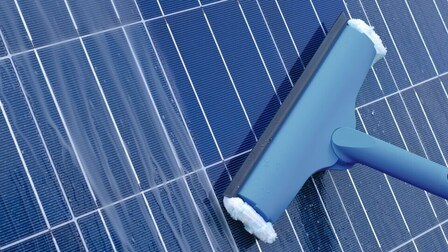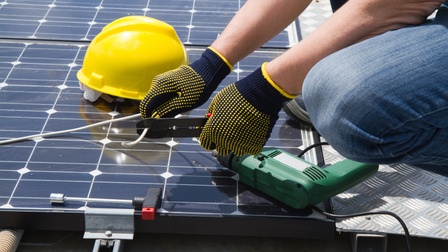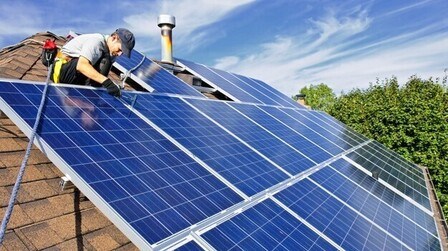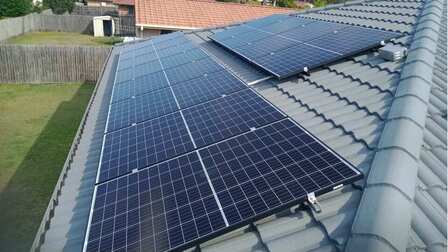Over the past years, green energy has been raged the world over. Solar energy is one form of energy that is a firm favorite for many environmentally conscious people.
All thanks to the growing awareness of the effects of greenhouse gases that are emitted when fossil fuels burn, more people are shifting to more eco-friendly sources of energy such as solar energy. Also, solar energy is a cost-effective way of drastically cutting or even eliminating your electric bills
In this write-up, we want to get you acquainted with the working of solar energy systems before you decide to go solar. So, we've got you covered with everything you need to be familiar with as far as the working of the solar panel goes.
Let’s get started, shall we?
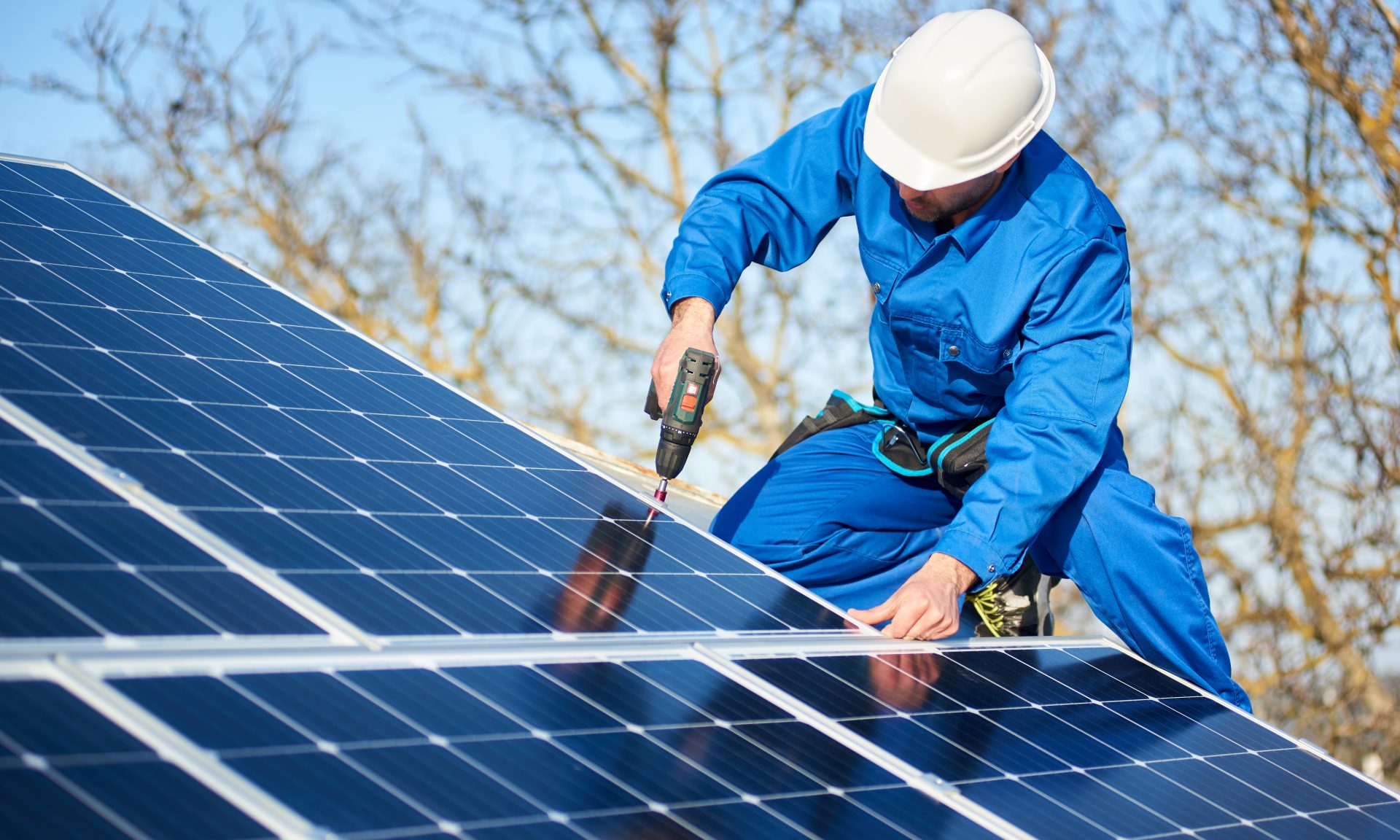
How Do Solar Panels Work?
How Do Solar Panels Produce Electricity?
Solar panels are made of small units that are linked called photovoltaic cells (PV). Photovoltaic simply means it can convert sunlight into electric power. The cells are made of two sheets of semiconducting material, normally silicon. Semiconductors can conduct electricity and still maintain the electrical imbalance required to produce an electric field.
Phosphorous is also added on top of the silicon to add the number of electrons and produce the negative charge. The layer of silicon at the bottom receives a small amount of boron which reduces the electrons and gives out a positive charge. Ultimately, the two charges created will result in an electric field created at the junction between the upper and lower silicon layers.
When sunlight hits the solar panels, the cells produce energy by using particles of light or photons to detach electrons from atoms and make them free. The electric field created between the silicon layers will drive the electrons away from the silicon junction.

The electrons will then be captured by dedicated components and turned into usable electric power. The electric field that is established flows to the edges of the solar panel into metal conductive plates or wire which transports the current to the inverter. Afterward, the inverter converts the direct current (DC) produced into alternating current (AC).
Solar panels can work without a battery. This can be made possible through a high PV input MPPT controller, which converts solar energy from PV to loads directly and at the same time channel some amount to a storage battery if one is available.
Can Solar Panels Work Without Battery or Sunlight?
Solar panels cannot produce power without sunlight. You will need a battery to store excess energy. You can then draw the power stored in the battery and use it to power your appliances during the night when there isn't any sunlight.
Even so, you can still use solar power without a battery. One way of using solar without a battery is by net metering. Here, an arrangement is made where the excess power produced by the panels during the day is deposited onto the grid, kind of like a savings account.
During the night when the panels will not be producing any power, the grid electricity company reimburses the bill and gives you the power you credited into their electric grid system. So, the electricity you deposited into the grid makes up for the cost of the power you will use at night.
Unfortunately, net metering is only offered in some areas by specific utility companies. Some electricity suppliers have since discontinued net metering. You will need to make a bidirectional connection that enables electricity to flow both in and out of your home.
How Does a Solar Panel Work in the Rainy Season?
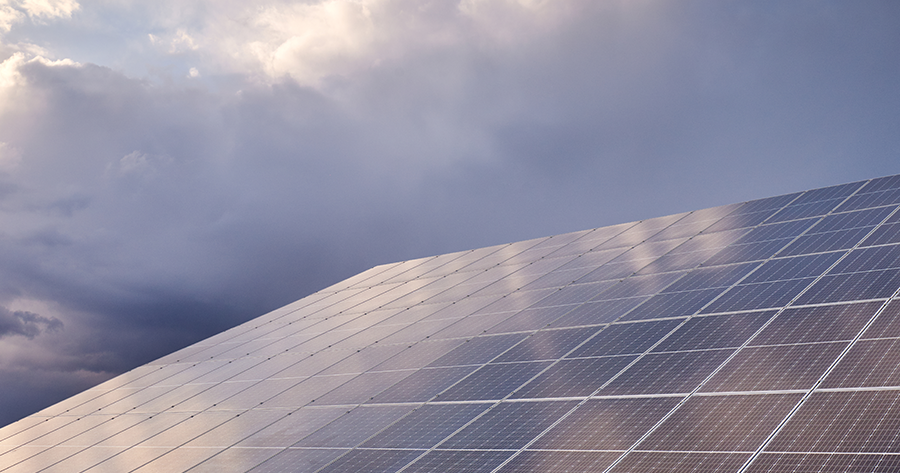
How Does a Solar Panel Work in the Rainy Season - Source: Infiniteenergy
Rainfall may have no impact on the amount of solar energy that reaches your panels, but rain clouds will stand between your panels and the sun and lead to a significant drop in power production. Rain also helps wash away dust and dirt and allows your panels to operate more efficiently.
The best part, all thanks to innovation, with the help of triboelectric Nanogenerators, modern PV energy systems are designed to produce energy from the force of the rain droplets falling on the panels.
Types of Solar Panels
Solar panels come in three main varied types designed differently to serve different needs and purposes. First Generation Solar Panels include Monocrystalline Solar Panels and Polycrystalline Solar Panels. On the other hand, second Generation solar panels comprise Thin-Film Solar Cells and Amorphous Silicon Solar Cells. Let's have a look at the most common types.
1. Monocrystalline Solar Panels
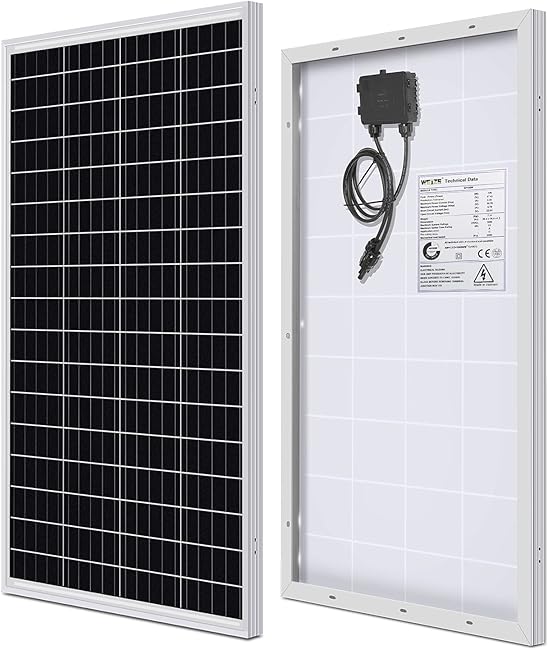
The most conventional and pure breed of solar panels, they are arguably the most common. They are identifiable by the uniform dark or black appearance of the cells, and round edges.
The monocrystalline solar cells are cut from single, pure silicon crystals which give these panels some of the highest efficiency rates, clocking impressive efficiencies upwards of 20%. They also boast high power outputs, a more compact build, and high resilience and longevity. Even more,
Monocrystalline solar panels are less likely to be affected by high temperatures than polycrystalline panels
On the flip side, these panels have the flaw of being more costly than the other types.
2. Polycrystalline Solar Panels

Polycrystalline Solar Panels have a lower efficiency of about 15% and are more enormous and space-consuming. More than that, polycrystalline panels are constructed by melting together raw crystals of silicon in a mold and cut into wafers. This process is much cheaper and faster. Therefore, they are much cheaper than their Monocrystalline counterparts.
But then again, they are easily affected by high temperatures.
3. Thin-film Solar Panels

Thin-film Solar Panel
One downside is that they are enormous and will hog a substantial amount of real estate. This makes them impractical for residential houses. Also, they are less durable and have a shorter lifespan than their aforementioned counterparts.
Among all the types of solar panels that we've looked at, we'd root for Monocrystalline Solar Panels since they are more efficient, compact, durable, and are less affected by temperature.
Solar Panel Applications, Advantages, and Disadvantages
What Can Solar Panels Be Used For?
There are some applications of solar energy:
Powering
Solar energy is used to power residential and business setups. Homes and businesses can use solar power to run electric appliances.
Heating
Solar water heating systems are an efficient way of heating water for bathing in homes and buildings. That is not all. Solar space heating systems are often used to power radiant floors besides being paired with Forced Hot Air systems to heat homes and buildings during cold weather.
Lighting
Solar lighting technologies have been instrumental in illuminating our homes, security lights, street lighting, and road signs among others
Ventilation
Solar ventilation solutions like solar attics also help in cooling homes and buildings during hot summer weather.
Automobile
Multiple companies have ventured into the production of solar-powered vehicles. This eliminates the need for fossil fuels and saves on the cost.
Portable Devices
Some solar-powered devices such as calculators, radios, and mobile phones are fitted with compact solar panels which they rely on for power.
Benefits of Using Solar Panels
Solar Energy is Renewable
Sunshine is an abundant resource the world over that won't run out. Unlike fossil fuel deposits which are often exhausted in 40-60 years, the sun will always shine.

Clean, Pollution-free and Eco-Friendly
Solar panels are emission-free and seldom let out toxic carbon emissions. Other forms of energy like fossil fuels are known for emitting greenhouse gases and pollutants which are detrimental to our environment and our health.
Cost-Efficient
Save for the initial cost of installation, PV systems do not pose monthly bills like utility grid power. Little maintenance is required and the cost of maintenance is also low.
Better yet, you can sell excess power back to the utility company if you have interconnected it to the grid. Moreover, there are federal grants, tax incentives, and government rebates to help cover the initial costs.
So, you get a return on the investment regardless of the time frame unlike paying for grid electricity bills.
Multifunctional and Versatile
Solar power can be used in diverse ways including powering homes, heating homes and water, powering cars, and more. What's more, PV systems can be installed anywhere, including remote locations where access to grid electricity is limited.
Safety
Solar panels or modules generally have a lower voltage and are, therefore, safer than grid electricity. Also, solar power installations have a lower risk of causing fires than utility power.
Disadvantages of Solar Panels
Storage Limitations
Those who have not connected with grid electricity will need large battery packs to store energy for use at night.
However, the batteries usually have a fixed capacity and once full, the remaining solar energy that is harvested normally goes into waste. On top of that, if you need to power heavy-duty appliances that require more power, you will need more panels and a larger battery which in turn demands a larger space to install.
Availability
Some geographical locations receive very low sunshine and may not be feasible for solar energy production. Furthermore, unfavorable weather such as cloudy conditions and the winter season will limit the efficiency of the panels and ultimately the production energy. At times, the sun may shine today but may fail tomorrow.
High Initial Cost of Installation
Although using solar energy may save you a ton of money in the long term, the upfront cost of acquiring PV systems is quite high.
Despite the gradually reducing cost over the years, the cost of purchasing solar panels and acquiring wires, inverters, batteries, among other components, can be quite outrageous and out of reach if you are short on cash.
Solar Panel Efficiency
How Efficient is a Solar Panel?
Solar panel efficiency is the amount of energy that the panel can convert into usable power as a percentage of the total amount of power that hits its surface.
Put simply, when two panels of varying efficiency are exposed to the same amount of light, the less efficient panel will generate less power than the more efficient one. More efficient panels will thus produce more power while occupying as little space as possible.
The majority of PV systems are around 15% and 20% efficient, although some more modern, high-end panels will exceed 22%.
In light of this, let's find out just what may be affecting the efficiency of your panels.
Which Affects Solar Panel Efficiency?
Below are factors affecting solar panel efficiency:
Type of Solar Panel - We presume that you caught on to the fact that monocrystalline panels are more efficient than polycrystalline and thin-film solar panels. Besides, the arrangement of wires and the organization of bus bars will have an effect on the efficiency of the panels.
Temperature - The solar panel's semiconductor material, silicon in most cases, is naturally affected by high temperatures. So, when the temperatures increase, the efficiency of the panels will reduce. Solar panels give out more energy during cool and sunny days.
Shading - It is important to note that solar panels are usually arranged and connected in series. This arrangement maximizes the voltage. When one panel or solar cell is shaded or obstructed from sunlight the whole series is affected and the total energy production is lowered considerably. One way of working around this power loss is including a bypass diode so when one cell is shaded, the diode helps reduce voltage loss.
Reflection - The shiny surface usually reflects some small amount of light away from the solar panel. This reflection reduces the energy conversion efficiency of the panel. For this reason, the layer of glass on top of PV panels is designed to reduce this reflection.
Maintenance - It is important to clean the panels from time to time and remove dirt and leaves. The muck blocks light from reaching the PV cells and reduces the efficiency of the panels. Not just that. Although solar panels are very durable and can take a serious beating, panels that have outlived their lifespans of at most 25 years are likely to have reduced efficiencies.
How Can We Increase the Efficiency of Solar Panels?

When purchasing the panels, look out for models with the highest efficiency but still within your budget. They should have a high concentration of PV cells.
Frequently clean the panels to remove dirt, dust, and leafage
Install the panels in an open area facing the direction of the sunsets. Avoid places that have been shaded by trees or other buildings. Make sure the panels are tilted properly to ensure maximum contact with sunlight for most hours of daylight.
Carry out regular checks to identify panels that may be out of position, damaged or dirty. Replace or remount if any.
Allow space between the panels and the roof when installing to enable free flow of air and reduce the temperatures.
Include bypass diodes to reduce power loss in case of shading.
Are Solar Panels a Good Investment?
Solar panels are a worthy investment since you get to save a ton by reducing or eliminating electricity bills. Better yet, research has shown that properties with solar power installed are also likely to rise in value.
Solar Panel FAQS
How long will solar panels last?
Do solar panels need maintenance?
At what temperatures do solar panels work best?
What is the maximum temperature a solar panel can withstand?
Do solar panels melt the snow?
Do solar panels make your roof hotter?
Can solar panels be recycled?
How Solar Panel Works - Conclusion
If you are genuinely into environmental conservation and combating greenhouse gas emissions, and are looking to save a few bucks as far as electricity bills go, then solar energy is the way to go. Now that you have all the information at your disposal, do not think twice about taking the plunge and setting up your solar PV system.

